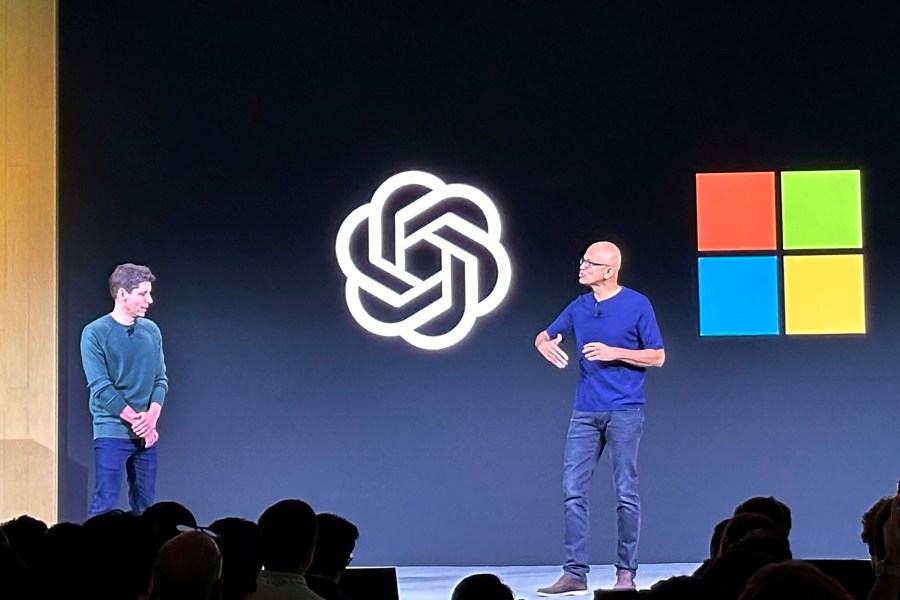Microsoft may have just pulled off the greatest anti-competitive heist of the century. By capitalizing on the recent at OpenAI, one of the world’s most advanced artificial intelligence technology developers, Microsoft has super-charged its vision of shaping and controlling the artificial intelligence (AI) market. Now, the most important technology of our time is at risk of being locked in silos, and that is not an outcome anyone should welcome.
What we are looking at now is Microsoft’s race toward establishing control over a collection of AI resources that will evolve together in what is commonly called a “ . ” The problem is that an AI silo would be detrimental for technology development, as well as costly and potentially dangerous for society and the economy. Innovation would be slower and more fragmented, subjecting end users to higher prices and just “good enough” substandard technology.
To understand how we got here, look back to July 2019, when Microsoft made its first large investment of in OpenAI. About half of this investment came in the unconventional form of cloud credits, which were to be used by OpenAI to develop its models on Azure, Microsoft’s cloud computing platform. If Microsoft’s goal was to bind OpenAI into its massive existing ecosystem and business, this was a brilliant stroke.
The investment also avoided scrutiny from most technology and regulatory observers — after all, OpenAI operated in what was still largely an area of research with limited applications for the public and for enterprises at that time. But this move yoked the early development of OpenAI’s models onto Microsoft’s cloud architecture, ensuring that the two would evolve together. Training OpenAI’s models has been one of the most intensive tasks ever undertaken in modern computer science.
The required processing power would have been prohibitively expensive for a typical research-oriented startup like OpenAI to access on the open market — but not for Microsoft, a hyperscale cloud provider with strategic largesse. As the revolutionary possibilities of such technology became increasingly clear, OpenAI led the way with some of the best scientists and liberal access to Microsoft’s computing resources. Earlier this year, Microsoft sealed its OpenAI relationship with another major investment — this time around , much of which was, once again, in the form of cloud credits instead of conventional finance.
In return, OpenAI agreed to exclusively through Microsoft’s Azure cloud and granted Microsoft to its intellectual property. Which brings us to the recent tumult at OpenAI, whose board tried but ultimately failed to remove CEO Sam Altman in November. After OpenAI’s board announced Altman’s firing, Microsoft CEO Satya Nadella that Altman and his colleagues would be joining Microsoft to lead a new advanced AI research team for the company.
But just later, Altman was back as OpenAI’s CEO and Microsoft had gained a This may have been the best possible outcome for Microsoft: Now it’s unnecessary for the company to “acqui-hire” OpenAI by taking on its staff and to invite the competition policy scrutiny that such a development would have almost certainly entailed. For Microsoft the crisis at OpenAI came up “heads I win, tails you lose. ” Recent reports that competition authorities and the ommission (FTC) are scrutinizing Microsoft’s investment in OpenAI are encouraging.
But Microsoft’s failure to report these investments for what they are – a de facto acquisition – demonstrates that the company is keenly aware of the stakes and has taken advantage of OpenAI’s somewhat as a non-profit entity to work around the rules. What matters more, however, is the impact on this transformative technology and on the broader market landscape. AI is about to become the single most important test case for the FTC’s modern theory of competition policy.
It’s not just about technology; it’s now equally about the business practices and industry structure to which that technology is yoked. It’s also about the prospective harms to the innovation and competition ecosystems, not just demonstrated pricing power that impacts consumers right now. History has a useful analogy.
In the early 1990s, there was a deep fear among the tech community that the internet would be segmented into silos – a Microsoft Explorer Web, a Netscape Web and others – and that consumers, businesses and technology developers would be forced to choose where they wanted to be. Luckily, we avoided that suboptimal and fragmented world through a combination of government policy and the underlying open protocols that drove the web. Imagine how hard it would have been to “fix” the ecosystem and restore interoperability for a single World Wide Web if that history had been different, and governments had simply waited and hoped for the best as a fast-evolving technology played out.
The U. S. government needs to quickly step in and reverse the negative momentum that is pushing AI into walled gardens.
The longer it waits, the harder it will be, both politically and technically, to re-introduce robust competition and the open ecosystem that society needs to maximize the benefits and manage the risks of AI technology. .
From: thehill
URL: https://thehill.com/opinion/technology/4372206-for-microsoft-the-openai-tumult-is-heads-i-win-tails-you-lose/



